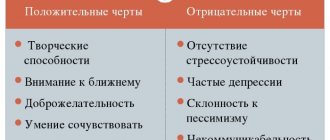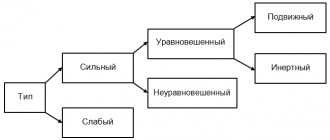The topic to which this article is devoted has been of concern to the global scientific community for several decades - it is directly related to the individual personal characteristics of people.
Everyone knows that the psyche of each person is unique. And this is connected both with the physical and biological characteristics of the organism, and with a complex of social characteristics. If we talk about biologically determined substructures, then, mainly, we need to consider temperament.
What is temperament?
Temperament implies the mental differences of people, which include the depth, intensity and stability of emotions, energy and pace of actions, emotional sensitivity and many other features of mental life. And the problem of temperament today remains controversial and unresolved. But even if we take into account all the diversity of approaches to its study, researchers agree that temperament is the biological foundation on which a person’s personality as a social being is based.
Temperament is a reflection of the dynamic aspects of behavior, which are mainly innate. Its properties are more stable than the properties of other mental characteristics of a person. And its most striking nuance is that the properties of the temperament of one particular person are not combined with each other by chance - they are interconnected naturally and form a certain conglomerate that characterizes the temperament.
To summarize: temperament must be considered as individually unique properties of the psyche that determine the dynamics of an individual’s mental activity; manifested equally in various activities, regardless of its motives, goals and content, and remaining unchanged already in adulthood, and also characterizing in the aggregate the type of temperament.
However, before considering the types of temperament and their features, it should be said that temperament cannot be bad or good, because Each type has its own advantages, and the efforts of any person should be aimed not at correcting its shortcomings, but at effectively applying its advantages in everyday life and activities.
Differences between temperament and character
Temperament is the foundation for a larger characteristic of the human personality - character. Sometimes these concepts are not distinguished and confused, although, in a strict sense, they are not the same thing. It was said above about acquired skills, habits, character traits and their difference from innate ones. So, character is precisely the acquired mental properties, although formed under the influence of innate qualities.
The character of representatives of different temperaments may be the same, but it manifests itself in different ways. Thus, phlegmatic people and sanguine people can be equally sociable, but the external manifestation of this sociability will be significantly different. Some specific innate qualities can predetermine the development of some character traits and counteract the emergence of others. It also happens that the development of certain character traits allows a person to restrain negative and currently undesirable innate properties; this phenomenon lies, in particular, at the basis of willpower.
Knowledge about the dependence of innate and acquired qualities allows you to find an individual approach to raising children. A child with any personality type (melancholic, choleric, sanguine or phlegmatic) can develop any character traits, but the methods of education must be different.
Let's return to outstanding personalities. Mikhail Illarionovich Kutuzov was a phlegmatic person by nature, but the corresponding innate mental properties alone could not have made him a famous commander - a choleric person would have been more useful here. Education, training and self-improvement made Kutuzov the way he went down in history.
Isaac Newton seems to us a pronounced phlegmatic person, but his contemporaries described him as a typical melancholic person. Russian Emperor Nicholas I was also melancholic, famous for his harsh “stick” regime of government, military discipline and ruthless fight against corruption - that is, all that, in theory, should reveal a choleric person in him.
In general, character is something that needs training, development and hardening. As a result, even a person with weak innate abilities can show strength of character. This is often observed in emergency situations - for example, during war.
Creation of typologies of temperament
Since ancient times, people have strived to understand and identify the typical mental characteristics of different people and unite them into a small number of generalizing models. It was these models that were called temperament types; moreover, they were very practical, because through them it was possible to predict the behavior of a person with a certain type of temperament in a specific life situation.
It is officially believed that the doctrine of temperament in general was created by the ancient Greek physician Hippocrates, who argued that people are distinguished by four main “body juices” - blood, phlegm, yellow bile and black bile. Following the teachings of Hippocrates, the equally famous physician of antiquity, Claudius Galen, created the first typology of temperaments of its kind and outlined it in his treatise “De Temperamentum”. According to his ideas, the type of temperament depends on what type of “juice” predominates in the human body. It was Galen who identified four known types of temperament: melancholic (black bile predominates), choleric (yellow bile predominates), phlegmatic (phlegm predominates) and sanguine (blood predominates). The presented concept has been of great importance to scientists for many centuries.
In the dictionary Dictionary of foreign words
a, m.
1. The set of mental properties of a person, characterizing the degree of his excitability and manifested in his attitude to the surrounding reality, in behavior. | Types of people by temperament: melancholic, sanguine, phlegmatic, choleric.
2. Vital energy, the ability to rise internally. A man with temperament. Temperamental - very lively, energetic; having a great, fiery temperament.
Share the meaning of the word:
Constitutional typologies of temperament
Subsequently, many typologies of temperament were put forward. But the greatest interest is caused by those among them where the properties of temperament, interpreted as innate or hereditary, are associated with individual characteristics in physique. Such typologies are called constitutional (typology by W. Sheldon, typology by E. Kretschmer and others). But, of course, such concepts have been criticized by psychologists. And their main drawback is that they underestimate, and often completely lose sight of, the influence of the environment and social conditions on the formation of a person’s psychological properties.
Representatives of different temperaments from different sides
Everyone knows that everything has both positive and negative sides. And temperament in this sense is no exception. Each type has both its pros and cons, which we will discuss below.
If you educate correctly and do not overdo it with control or self-control, then each representative can express himself like this:
- phlegmatic people are self-possessed people who are alien to hasty decisions;
- melancholic people are people who deeply care about others and are very impressionable;
- sanguine people - can become responsive people who are ready for any work;
- choleric people will become passionate and active people in work.
As for the negative aspects, different types have their own disadvantages:
- melancholic people are withdrawn and shy;
- phlegmatic people are indifferent to people and the environment;
- sanguine people are superficial and scattered, they are fickle;
- choleric people are always in a hurry, and everything is done hastily.
The theory of I. P. Pavlov
The fact that the course of mental processes and the behavior of an individual depends on the work of the nervous system, which plays a dominant role in the body, has been known for a long time. But the theory of the connection between temperament types and certain general properties of nervous processes was first proposed by the Russian physiologist I. P. Pavlov. It was subsequently developed by his followers.
In the understanding of Academician Pavlov, the type of nervous system is innate and is least subject to any changes under the influence of upbringing or environment. The properties of the nervous system, according to his ideas, form the physiological basis for temperament, which is a mental manifestation of the general type of the nervous system. Pavlov's subsequent studies on animals made it possible to identify types of nervous systems, which he proposed to extend to humans as well.
Choleric - characteristics of temperament: pros and cons
Cholerics have a strong-willed character.
Type of nervous system: unbalanced, unrestrained, overly mobile.
A choleric person takes on any difficult task, no matter how difficult it is. Such people are excellent speakers, they are eloquent and convincing in almost any dispute.
Choleric people are not vindictive, they quickly forget grievances and cannot hold within themselves for a long time a feeling of anger towards the offender.
Cholerics are excellent leaders; they can organize people and make difficult decisions for them. In a critical situation, a choleric person is able to group, repel the enemy, and protect a weak person.
The choleric person is not restrained in his statements in relation to current events, and can sometimes become rude.
Cholerics have a certain tendency to dominate other people. Often people with such temperaments are prone to rapid mood changes and excessive gesticulation.
In the love sphere, the choleric person is quite jealous, and for him the loved one becomes a kind of property. People with this type of temperament quickly fall in love and become attached to another person. Sometimes choleric people in relationships are prone to anger and scandals.
Choleric children are quite capricious and are often the center of attention in the family. A child can use his emotions to achieve the desired result. Such children are often capricious, show hyperactivity in adolescence, and may become interested in sports or music, but they quickly become bored with their hobbies.
Disadvantages of a choleric person
The main disadvantages of a choleric person include:
- Excessive haste in your actions and actions;
- Cholerics are not patient;
- Excessive impulsiveness and imbalance;
- Excessive straightforwardness and harshness when communicating with other people;
- Aggression that occurs periodically;
Psychologists recommend that choleric people learn to work on themselves. This work should include the ability to control oneself in any conflict situations. Often choleric people make rash decisions and literally throw themselves into the pool headlong. The ten-second tactic suits them, which consists of mentally counting to ten before making an important decision or expressing an opinion.
Components of temperament types
Every person has their own type of nervous system. Its manifestations (these are the characteristics of temperament) are an important part of individual psychological differences. The manifestations of any one type of temperament are very diverse; they can be traced in the manner of behavior, and also manifest themselves in the nature of mental activity, actions, sphere of feelings, motives, cognitive activity, characteristics of a person’s speech, etc.
To compose a psychological characteristic of one of the generally accepted types of temperament, they usually resort to the following basic properties:
- Emotional excitability - the speed of occurrence of an emotional reaction and the force of influence necessary for its occurrence;
- Introversion/extroversion – features of the dependence of a person’s reaction and activity. If they depend on external stimuli, then the person is an extrovert, if they depend on internal ones, then he is an introvert;
- Rate of reactions - the speed with which mental reactions and processes occur, speed of mind, rate of speech, etc.;
- Rigidity and plasticity – a person’s ability to adapt to external influences;
- Reactivity - the degree of involuntary reactions to internal or external stimuli of the same intensity;
- Activity – the intensity of a person’s impact on the outside world and the ability to overcome obstacles on the way to achieving a goal;
- The ratio of reactivity and activity is the dependence of human activity on internal or external circumstances, as well as beliefs, intentions, goals;
- Sensitivity is the level of the lowest intensity of external influence necessary for the occurrence of a mental reaction.
In connection with these properties, the outstanding Polish psychologist and doctor of science Jan Streliau gives the most popular characteristics of temperament types.
A scientific approach to the study of temperament
Modern psychology is actively studying what temperament is and how it affects behavior. Today, scientists share the influence of temperament on a person’s emotionality and activity, so traditional classifications have been improved. Such scientists as Carl Jung, Hans Eysenck, Boris Teplov and other famous scientists worked on the study of temperaments.
The Russian scientist Ivan Pavlov made a great contribution to the study of temperaments. He proved that the higher nervous activity of animals and humans is structured in the same way, therefore types of temperament are also present in animals (they are most pronounced in mammals). Boris Teplov did a lot of work on studying the dynamic features of higher nervous activity. He studied the rate of emergence, progression and cessation of mental processes.
Carl Jung introduced the concepts of introvert and extrovert, reflecting a person’s inclination and ability for interpersonal communication. He paid attention to the dependence of temperament on feelings, thinking, sensations and intuition. In the alternative classification proposed by Jung, 8 personality psychotypes are presented.
Hans Eysenck collected all available information and created a new technique for fairly accurately determining temperament. It remains relevant, providing good accuracy today, due to which it is actively used in modern psychology under the name “Eysenck Temperament Test”.
Temperament types
According to J. Strelyau, the four main types of temperament are characterized by the following features:
Melancholic
A melancholic person is a person with high sensitivity and low level of reactivity. High sensitivity often leads to the fact that even a minor reason can cause tears. A melancholic person is painfully sensitive and very touchy. He has inexpressive movements and facial expressions, a quiet voice, poor movements, and a low energy level. As a rule, he is timid, unpersistent, unsure of himself, quickly gives up when doing things, has little ability to work and gets tired easily. The attention of such a person is unstable, all mental processes are slowed down. Most melancholic people are introverts.
Choleric
A choleric person is not particularly sensitive, has high activity and reactivity, and reactivity dominates, which is why he is quick-tempered, impatient, unrestrained, unbridled. Facial expressions, gestures and speech are rich and reflect the mood. His aspirations are stable, his interests are unshakable. The choleric person is persistent and sometimes has difficulty switching attention. In the vast majority of cases, choleric people are extroverts.
Phlegmatic person
A phlegmatic person is characterized by high activity, which dominates over low reactivity. He is insensitive and little emotional. External stimuli have a very weak effect on it; able to remain calm in unexpected situations. Also, phlegmatic people have slow and inexpressive movements, the same speech, and poor facial expressions. He has difficulty switching his attention, rebuilds habits and skills very slowly, but he has energy and high performance. Most phlegmatic people are introverts.
Sanguine
A sanguine person is a person with high reactivity, which is on par with activity. It is characterized by lively facial expressions, a wealth of gestures, a quick response to external circumstances, and ease of switching attention. Very sensitive, active, can work for a long time without getting tired. Disciplined, resourceful, has good ability to concentrate and self-control. His interests, moods and hobbies can change quickly. Almost all sanguine people are extroverts.
Definition of temperament and brief instructions for interaction
You can guess the temperament of your interlocutor based on observations of him, but this is an ambiguous and complex method. Currently, there are many accurate methods for diagnosis and self-diagnosis.
- Eysenck test. The most popular technique that determines the type of temperament on two scales: stable and unstable, introversion and extroversion. Allows you to determine the severity of each type and the nature of mixed temperament. Suitable for self-diagnosis.
- Another popular technique is the Belov formula. This questionnaire is smaller than the previous one, characterizes only temperaments (without scales), but also gives the value and percentage of each type in a person.
Determining temperament is the first stage, but far from the main one. Much more important is the ability to understand the person opposite and interact with him competently, taking into account his innate characteristics.
Interaction with a choleric person
- Remember that not everything that a choleric person says is really true. It's just that his speech is ahead of his thoughts.
- The conditions and specific emotions of the choleric person at the moment are to blame. Under other conditions, he may say the opposite.
- If, in a fit of anger, a choleric person said something unpleasant, this does not mean at all that he really has a bad opinion of you.
- In a relationship with a choleric person, you should be lenient, not take everything to heart, take into account situations that are individually dangerous for him and avoid them.
- Remember that choleric people do not get hung up on quarrels and conflicts (especially random and momentary ones), they actually forget them and never return to discussions.
- Do not put pressure on the choleric person, especially in work matters.
- Instead, give yourself a break and provide support.
Interaction with a sanguine person
- Communication is the air for a sanguine person. It’s worth getting used to and accepting the fact that there are always a lot of people around him. People are drawn to a sanguine person, and he is drawn to them.
- It seems that it is impossible to argue with him, but this is not so. Despite their optimism and friendliness, sanguine people are rich in “cockroaches”.
- Due to the superficiality of their judgments, sanguine people often make the wrong conclusions. But they cannot be superficial. Remember this and give them a second chance.
- It is difficult for a sanguine person to admit his mistakes; he does not know how to do this. That's why you shouldn't wait for it.
- Face - instructions for a sanguine person. The case when everything is really written on the face. Be observant, and the facial expressions of a sanguine person will tell you everything: what a person thinks, what is pleasant to him, what is unpleasant, and so on.
- Constantly feed it with impressions and events. With monotony and the same type of sensations, a sanguine person gets bored and may leave the relationship. But they become attached to those who always give them new emotions, sensations and conditions of reality for a long time.
- Sanguine people like it when they are asked for advice or asked for their opinion.
- Reason with him, solve problems, make plans.
- Don't neglect extreme sports and adrenaline.
Interaction with a melancholic person
- Avoid loud and sharp sounds and screams.
- Do not resort to a negative assessment of the melancholic person and what is dear to him.
- Avoid criticism, punishment, and reproach. If necessary, choose soft, non-accusatory forms.
- Getting close to a melancholic person is simple - you need to evoke self-pity, tell a sad story, evoke and show sympathy.
- Avoid extreme situations and entertainment.
- Preference should be given to warm, sincere conversations.
- When it comes to films, a melancholic person will prefer drama to horror and thrillers.
- Never say “urgently”, don’t push, don’t demand, don’t order. This drives the melancholic person into a stupor, he begins to frantically make the wrong movements, panics, and does not understand anything.
- In detailed work that requires focus and attention, a melancholic person is an excellent candidate.
- A melancholic person should be introduced to new people gradually and carefully. Don’t “throw him into the hole with all his might.”
- Melancholic people have well-developed intuition, they rarely make mistakes.
Interaction with a phlegmatic person
- You can recognize a phlegmatic person only through communication, but you need to pull everything out with pincers.
- Phlegmatic people are conservatives, so you shouldn’t demand that they quickly get used to and accept something new.
- In new situations or after a non-standard proposal, give the phlegmatic person enough time to think.
- Don’t expect efficiency and speed in other matters either. A person interacting with a phlegmatic person must be able to wait and be patient.
- Don't expect sympathy or other emotional responses, especially momentarily.
- But this does not mean that they are completely indifferent and do not experience emotions. A phlegmatic person may worry about you, but it is difficult for him to squeeze out words or gestures; he would rather silently do something useful for you.
- By the way, they expect the same sympathy from others: support in deeds, not in words.
- If you want to win the favor of a phlegmatic person, then you need to be realistic, avoid fantasies, demonstrate logic and prudence, equanimity and rationality.
- Entertainment, holidays, creativity, and conversations do not attract a phlegmatic person. The matter is important to him.
- The second thing that attracts me is clear, practical, understandable speech. It is recommended to avoid imagery and slang when communicating with a phlegmatic person.
- It is better to write out all requests or tasks for a phlegmatic person on paper, writing them down as clear instructions.
There are no bad or good temperaments; you can find a common language with any person, however, provided that your temperaments coincide.
- For example, a choleric person is incompatible with a sanguine person. These are two leaders.
- Neither a choleric person nor a melancholic person can get along. One does not intentionally, but constantly offends, the other is offensive in itself.
- Choleric and phlegmatic are the best option.
- A sanguine person and a phlegmatic person will often quarrel, but at the same time they can resolve these conflicts. However, dissatisfaction with each other will increase.
- A sanguine person will be suited to his opposite - a melancholic person. Moreover, it is ideal if the sanguine person is a man.
Interesting Facts
I would like to introduce you, dear friends, to some interesting facts about temperaments.
- Happy married couples come from people with different temperaments.
- For friendship, on the contrary, it is important that the temperaments are the same (except for choleric people).
- Phlegmatic people are universal partners in any relationship, but not with phlegmatic people.
- Sanguine people make excellent leaders. A choleric or phlegmatic person is completely unsuitable for such a role.
- Job descriptions and other information should be presented in different forms for each temperament type.
- The phlegmatic person is slow to respond to questions.
- A sanguine person because of haste, and a choleric person because of impetuosity is prone to rash and incorrect answers.
- You need to ask a melancholic person gently and kindly.
- The specificity of people’s speech and the nature of information transfer depend on temperament. We can present the same picture from words of different types in completely different ways.
It is worth noting that in practice pure types of temperament are rarely found; mixed ones are more common. This makes it even more difficult to determine temperament and choose an approach to interacting with a person.
In conclusion, I would like to note that the compatibility of people in temperament, or at least understanding the characteristics of another person, is important for any area of relationships (family, professional, friendly). We often hear the phrase “We didn’t get along in character,” but in fact it would be more correct to say “We didn’t get along in temperament.” And this really can happen.
Summary
As noted above, none of the temperament types are either bad or good. In addition, a person cannot belong to only one single type - he can only have a predominant one, and the rest will be complementary. But, be that as it may, from the perspective of psychological science, types of temperament are only one of the ways of psychological assessment of a personality. You should also be aware that descriptions of temperaments may differ from one specialist to another and include many factors.
In Dahl's dictionary
M. lat. the nature of man, his natural constitution, in accordance with the basic qualities of the soul; There are four main temperaments: sanguine (alo-blooded), choleric (nervous), phlegmatic (white-blooded) and melancholic (black-blooded). Temperature, degree of heat, measure of hot and cold, using a thermometer. The room temperature is 15 degrees, the temperature in the room is 15°C. The average temperature in Paris is higher, and in Stockholm lower than in Moscow, in Paris it is warmer, in Stockholm it is colder, all year round.









